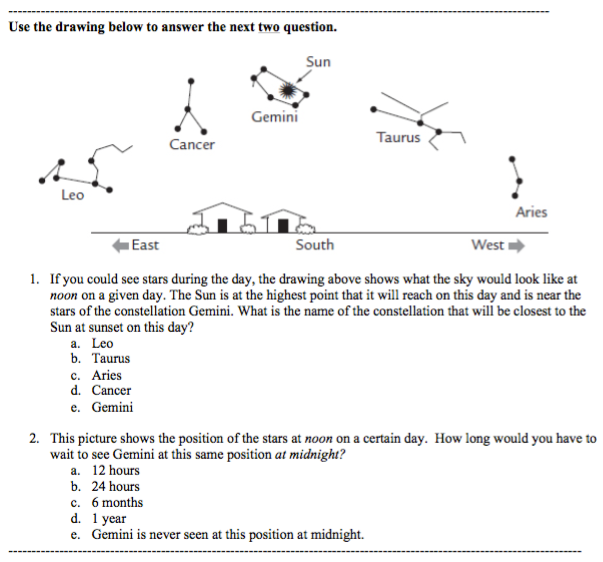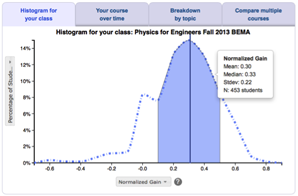Developed by Stephanie J. Slater
| Purpose | To measure students’ general astronomy content knowledge across the entire first-semester introductory course. |
|---|---|
| Format | Multiple-choice |
| Duration | 30 min |
| Focus | Astronomy Content knowledge (gravity, electromagnetic radiation, fusion and formation of heavy elements, evolution of the universe, star and stellar evolution, evolution and structure of the solar system, seasons, scale, yearly patterns, daily patterns, moon phases) |
| Level | Intro college |
Sample questions from the TOAST:

TOAST Implementation and Troubleshooting Guide
Everything you need to know about implementing the TOAST in your class.
Login or register to download the implementation guide.
more details
This is the second highest level of research validation, corresponding to at least 5 of the validation categories below.
Research Validation Summary
Based on Research Into:
- Student thinking
Studied Using:
- Student interviews
- Expert review
- Appropriate statistical analysis
Research Conducted:
- At multiple institutions
- By multiple research groups
- Peer-reviewed publication
The astronomy concepts covered on the TOAST were derived from three expert position statements about the core ideas in astronomy and a later review by 28 experts. The initial TOAST questions followed this set of scientific content criteria and best practices for test question construction. Existing questions were taken from other assessments when possible, and four new questions were written based on research into student thinking and the authors experience with teaching the content. The readability of the TOAST questions was tested and found to be appropriate. The test then underwent expert review and was revised. Next, the experts participated in think-aloud interviews as they answered test questions to check the scientific content. The TOAST was given to over 1000 non-science majors at five institutions and statistical analysis of reliability, difficulty and discrimination were conducted and reasonable values found. Responses were also compared to published research on student ideas about relevant topics to ensure the TOAST questions and responses were supported by relevant theory. The TOAST has been used with over 2000 students and results published in three peer-reviewed articles.
References
- D. Barringer, J. Plummer, J. Kregenow, and C. Parma, Gamified approach to teaching introductory astronomy online, Phys. Rev. Phys. Educ. Res. 14 (1), 010140 (2018).
- K. Berryhill and T. Slater, Opportunity to Learn: Investigating Possible Predictors for Pre-Course Test Of Astronomy STandards TOAST Scores, J. Astro. Earth. Sci. Educ. 4 (2), 95 (2018).
- D. French and A. Burrows, Inquiring Astronomy: Incorporating Student-Centered Pedagogical Techniques in an Introductory College Science Course, J. Coll. Sci. Teaching 046 (04), (2017).
- S. Slater, The Development And Validation Of The Test Of Astronomy STandards (TOAST), J. Astro. Earth. Sci. Educ. 1 (1), 22 (2014).
- S. Slater, S. Price-Schleigh, and D. Stork, Analysis of Individual Test Of Astronomy STandards (TOAST) Item Responses, J. Astro. Earth. Sci. Educ. 2 (2), 89 (2015).
- S. Slater, T. Slater, and A. Shaner, Impact of Backwards Faded Scaffolding in an Astronomy Course for Pre-service Elementary Teachers based on Inquiry, J. Geosci. Educ. 56 (5), 408 (2008).
PhysPort provides translations of assessments as a service to our users, but does not endorse the accuracy or validity of translations. Assessments validated for one language and culture may not be valid for other languages and cultures.
| Language | Translator(s) | |
|---|---|---|
| Japanese | Michi Ishimoto |  |
If you know of a translation that we don't have yet, or if you would like to translate this assessment, please contact us!
Score the TOAST on the PhysPort Data Explorer
With one click, you get a comprehensive analysis of your results. You can:
- Examine your most recent results
- Chart your progress over time
- Breakdown any assessment by question or cluster
- Compare between courses
| Typical Results |
|---|
Typical scores on the TOAST from Slater 2014.
|
The final version of the TOAST available here, vf, was released in 2008.






